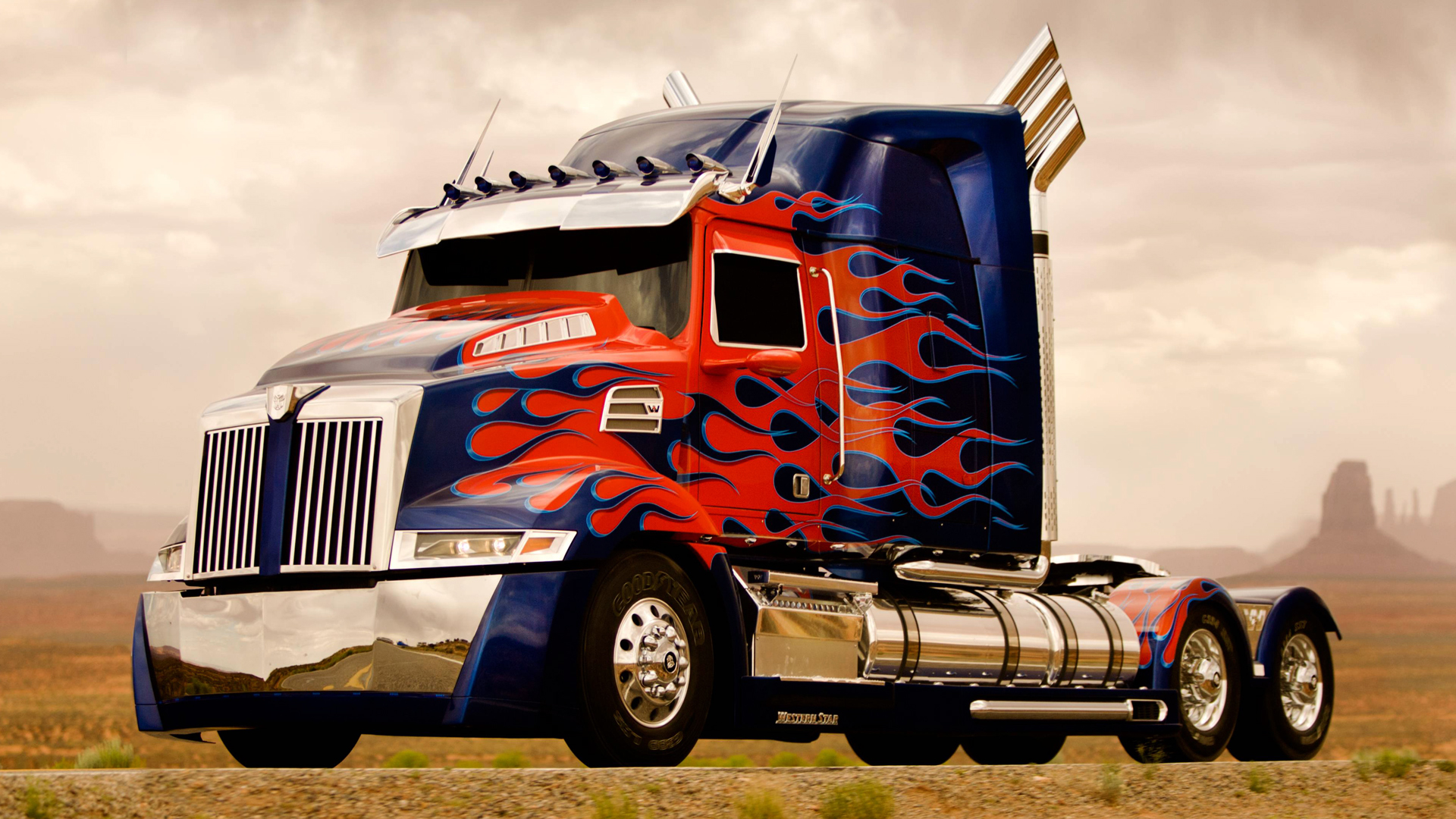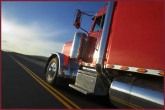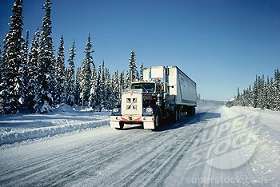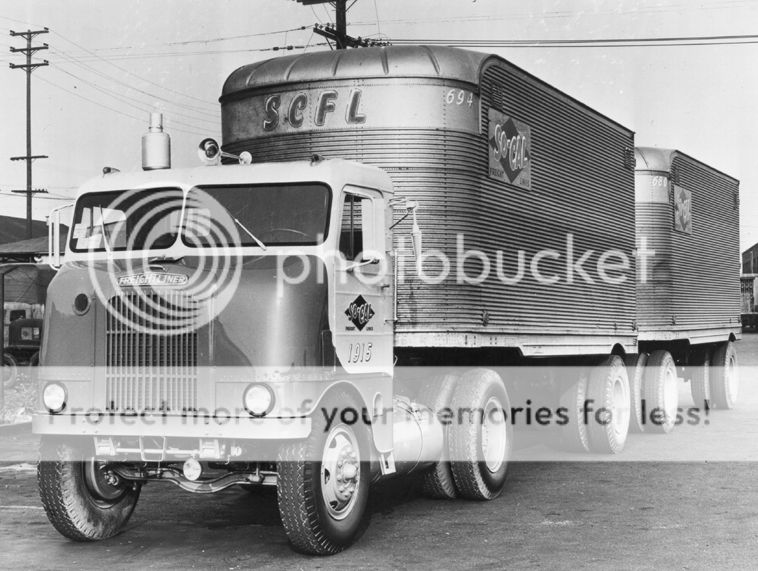LTL Trucking - My Linehaul Job
Topic 4501 | Page 27
But when you have the rest of your life to do this then what's the hurry? Is the risk/reward ratio of diving head first into the deep end worth it? That's a tough call.
Great points! Maybe I should exercise some "tactical" patience and take things one step at a time. Also, delaying flat-bed would give me something to look forward to as I work through the challenges of the first year. This decision would play a large roll in the companies I apply for. I would need to consider only multi freight carriers. The other aspect is hometime options, I was looking to try and be home most weekends (Maverick & TMC), but I might need to adjust those expectations if I pull dry van or reefer?
Dry Van:
A trailer or truck that that requires no special attention, such as refrigeration, that hauls regular palletted, boxed, or floor-loaded freight. The most common type of trailer in trucking.Reefer:
A refrigerated trailer.
HOS:
Hours Of Service
HOS refers to the logbook hours of service regulations.
Thanks for the info Tyler. Trying to get my foot in the door with one of these companies by starting on the dock is something I have definitely thought of. But I'm afraid of getting on, then ending up stuck on the dock for 3 years, or worse, even longer before getting a shot. I'm ready to make the change now. Get out and get rolling. I have seen job postings for FedEx as "Driver Apprentice" and in the description says you must already have a CDL OR permit to apply. Working on the permit thing now. Reading the book in my down times. Not sure about ABF, but I have emailed OD and talked to a FedEx driver that both said if getting hired on shortly after attending school, that they offer reimbursements.
If I could get a job making $55K - $70K/year, $4,000 for schooling is something I'd be glad to pay for that opportunity. I'm keeping my eye out on these 3 companies, reading a lot, and watching youtube videos to continue to learn. Working toward the permit for now, can't do much as far as schooling until the first of the year.
CDL:
Commercial Driver's License (CDL)
A CDL is required to drive any of the following vehicles:
- Any combination of vehicles with a gross combined weight rating (GCWR) of 26,001 or more pounds, providing the gross vehicle weight rating (GVWR) of the vehicle being towed is in excess of 10,000 pounds.
- Any single vehicle with a GVWR of 26,001 or more pounds, or any such vehicle towing another not in excess of 10,000 pounds.
- Any vehicle, regardless of size, designed to transport 16 or more persons, including the driver.
- Any vehicle required by federal regulations to be placarded while transporting hazardous materials.

I have an opportunity to get one of these linehaul positions. Applied today as a matter of fact.
I was also wondering, as someone asked, what happens if you get delayed for some reason (snow or ice or whatever) and you are up against your hours?
Anyone know how they deal with this as far as making up the delivery, retribution and the like?
Thanks,
Linehaul:
Linehaul drivers will normally run loads from terminal to terminal for LTL (Less than Truckload) companies.
LTL (Less Than Truckload) carriers will have Linehaul drivers and P&D drivers. The P&D drivers will deliver loads locally from the terminal and pick up loads returning them to the terminal. Linehaul drivers will then run truckloads from terminal to terminal.
I have an opportunity to get one of these linehaul positions. Applied today as a matter of fact.
I was also wondering, as someone asked, what happens if you get delayed for some reason (snow or ice or whatever) and you are up against your hours?
Anyone know how they deal with this as far as making up the delivery, retribution and the like?
Thanks,
there is a 16 hour provision for inclement weather , between the OTR ,I ran line haul for 15 yrs .
OTR:
Over The Road
OTR driving normally means you'll be hauling freight to various customers throughout your company's hauling region. It often entails being gone from home for two to three weeks at a time.
Linehaul:
Linehaul drivers will normally run loads from terminal to terminal for LTL (Less than Truckload) companies.
LTL (Less Than Truckload) carriers will have Linehaul drivers and P&D drivers. The P&D drivers will deliver loads locally from the terminal and pick up loads returning them to the terminal. Linehaul drivers will then run truckloads from terminal to terminal.Line Haul:
Linehaul drivers will normally run loads from terminal to terminal for LTL (Less than Truckload) companies.
LTL (Less Than Truckload) carriers will have Linehaul drivers and P&D drivers. The P&D drivers will deliver loads locally from the terminal and pick up loads returning them to the terminal. Linehaul drivers will then run truckloads from terminal to terminal.
I have an opportunity to get one of these linehaul positions. Applied today as a matter of fact.
I was also wondering, as someone asked, what happens if you get delayed for some reason (snow or ice or whatever) and you are up against your hours?
Anyone know how they deal with this as far as making up the delivery, retribution and the like?
Thanks,
If you run out of hours, LTL companies will put you up in a hotel where you can do your 10 hours. You just have to call in and let them know ahead of time. They'll re-route you to the nearest terminal , and send you to a hotel from there. A couple terminals at my company actually have rooms for drivers, but for the most part, it's a hotel.
As far as retribution, there is none. As long as you've been driving all day and not doing something else, if traffic or weather delays you, you have to stop when you run out of hours.
Terminal:
A facility where trucking companies operate out of, or their "home base" if you will. A lot of major companies have multiple terminals around the country which usually consist of the main office building, a drop lot for trailers, and sometimes a repair shop and wash facilities.
LTL:
Less Than Truckload
Refers to carriers that make a lot of smaller pickups and deliveries for multiple customers as opposed to hauling one big load of freight for one customer. This type of hauling is normally done by companies with terminals scattered throughout the country where freight is sorted before being moved on to its destination.
LTL carriers include:
- FedEx Freight
- Con-way
- YRC Freight
- UPS
- Old Dominion
- Estes
- Yellow-Roadway
- ABF Freight
- R+L Carrier
Linehaul:
Linehaul drivers will normally run loads from terminal to terminal for LTL (Less than Truckload) companies.
LTL (Less Than Truckload) carriers will have Linehaul drivers and P&D drivers. The P&D drivers will deliver loads locally from the terminal and pick up loads returning them to the terminal. Linehaul drivers will then run truckloads from terminal to terminal.
...Choose your school carefully! The other guy failed his cdl driving exam on his first try and I don't know what became of him.
I'll reiterate this. Most companies, including OD, have their 'select' schools they choose from. Check with OD first, if you're planning on joining, to make sure they recognize your intended school. Also, grades / scores are important. OD needs to see a certain grade average for consideration. Crete / Shaffer is the same way. I know because I was also looking at Crete / Shaffer before I settled on Old Dominion.
CDL:
Commercial Driver's License (CDL)
A CDL is required to drive any of the following vehicles:
- Any combination of vehicles with a gross combined weight rating (GCWR) of 26,001 or more pounds, providing the gross vehicle weight rating (GVWR) of the vehicle being towed is in excess of 10,000 pounds.
- Any single vehicle with a GVWR of 26,001 or more pounds, or any such vehicle towing another not in excess of 10,000 pounds.
- Any vehicle, regardless of size, designed to transport 16 or more persons, including the driver.
- Any vehicle required by federal regulations to be placarded while transporting hazardous materials.
OOS:
When a violation by either a driver or company is confirmed, an out-of-service order removes either the driver or the vehicle from the roadway until the violation is corrected.

Does all line haul pull doubles or is 6 strings unique in that aspect as well.
I know of two LTL companies that do not pull doubles - Ward Trucking and NEMF (New England Motor Freight). Having said that, I have seen some doubles being pulled by NEMF drivers, but it's rare. As has been mentioned, if you're running linehaul , you're pulling doubles.
LTL:
Less Than Truckload
Refers to carriers that make a lot of smaller pickups and deliveries for multiple customers as opposed to hauling one big load of freight for one customer. This type of hauling is normally done by companies with terminals scattered throughout the country where freight is sorted before being moved on to its destination.
LTL carriers include:
- FedEx Freight
- Con-way
- YRC Freight
- UPS
- Old Dominion
- Estes
- Yellow-Roadway
- ABF Freight
- R+L Carrier
Linehaul:
Linehaul drivers will normally run loads from terminal to terminal for LTL (Less than Truckload) companies.
LTL (Less Than Truckload) carriers will have Linehaul drivers and P&D drivers. The P&D drivers will deliver loads locally from the terminal and pick up loads returning them to the terminal. Linehaul drivers will then run truckloads from terminal to terminal.Line Haul:
Linehaul drivers will normally run loads from terminal to terminal for LTL (Less than Truckload) companies.
LTL (Less Than Truckload) carriers will have Linehaul drivers and P&D drivers. The P&D drivers will deliver loads locally from the terminal and pick up loads returning them to the terminal. Linehaul drivers will then run truckloads from terminal to terminal.Doubles:
Refers to pulling two trailers at the same time, otherwise known as "pups" or "pup trailers" because they're only about 28 feet long. However there are some states that allow doubles that are each 48 feet in length.

I am sure 6 String will agree that LTL is a different type of trucking compared to OTR.
On top of all the things that a rookie driver has to face and think about you have a military style schedule you have to keep.
You do nothing off the clock with LTL. Once you arrive at work you clock in and from that point you have a certain amount of time you have to be off the yard and on the road. With ABF once they call you at home to let you know you have a run to take, right then, you have 2 hours to get to work, do your paperwork, hook up your 2 units and pre trip them and get moving. No excuses.
It's a high pressure, high stress schedule that has to be kept. Does not matter if the customer is slow once you get to a place. You have a schedule and it must be kept.
@Future Rookie Almost, with very few exceptions, all LTL pulls doubles and even triples. The P&D guys pull smaller trailers in town but line haul , which is between one terminal to the next one, is doubles. Occasionally line haul will pull a 53' trailer but rarely.
Guy knows what he's talking about.
Working LTL can be more rigorous than truckload / OTR. You can look at it like this: an OTR gig will keep you away from home more, but you can have a more relaxed pace. LTL keeps you home daily (for the most part), but you are putting in 10-14 hour days. This is true whether you're a city or linehaul driver. It does vary, but there is certainly a rigidity to a schedule being kept. I chalk it up as part of the linehaul lifestyle. I work hard 5 days a week, to sleep in my own bed and see my family briefly during those 5 days, and then I get my two days off. But remember, I get paid very well too.
Another thing worth noting from Guy's post, in reference to ABF. They are similar to YRC in that you are on 'call' with a certain window to get to work for your shift. OD gives their extraboard or wild drivers a set schedule, in that you're always working your same 5 days, and you have about a 3 hour window when you can expect your call. At OD, there's none of that around the clock phone call stuff, and you'll always work the same shift (e.g. mostly days or mostly nights, no bouncing back and forth). Of course you have your scheduled runs, where those drivers aren't on call at all because they are not working as a wild driver or on the extraboard.
At my terminal, and it's the same across other OD terminals, you have a gate time. You're expected to leave at that gate time. If I have a gate time of 10:30 am, I'll arrive at the terminal around 9:30 to grab my bills, pre-trip, and hook up.
Terminal:
A facility where trucking companies operate out of, or their "home base" if you will. A lot of major companies have multiple terminals around the country which usually consist of the main office building, a drop lot for trailers, and sometimes a repair shop and wash facilities.
LTL:
Less Than Truckload
Refers to carriers that make a lot of smaller pickups and deliveries for multiple customers as opposed to hauling one big load of freight for one customer. This type of hauling is normally done by companies with terminals scattered throughout the country where freight is sorted before being moved on to its destination.
LTL carriers include:
- FedEx Freight
- Con-way
- YRC Freight
- UPS
- Old Dominion
- Estes
- Yellow-Roadway
- ABF Freight
- R+L Carrier
OTR:
Over The Road
OTR driving normally means you'll be hauling freight to various customers throughout your company's hauling region. It often entails being gone from home for two to three weeks at a time.
P&D:
Pickup & Delivery
Local drivers that stay around their area, usually within 100 mile radius of a terminal, picking up and delivering loads.
LTL (Less Than Truckload) carriers for instance will have Linehaul drivers and P&D drivers. The P&D drivers will deliver loads locally from the terminal and pick up loads returning to the terminal. Linehaul drivers will then run truckloads from terminal to terminal.
Linehaul:
Linehaul drivers will normally run loads from terminal to terminal for LTL (Less than Truckload) companies.
LTL (Less Than Truckload) carriers will have Linehaul drivers and P&D drivers. The P&D drivers will deliver loads locally from the terminal and pick up loads returning them to the terminal. Linehaul drivers will then run truckloads from terminal to terminal.Line Haul:
Linehaul drivers will normally run loads from terminal to terminal for LTL (Less than Truckload) companies.
LTL (Less Than Truckload) carriers will have Linehaul drivers and P&D drivers. The P&D drivers will deliver loads locally from the terminal and pick up loads returning them to the terminal. Linehaul drivers will then run truckloads from terminal to terminal.Doubles:
Refers to pulling two trailers at the same time, otherwise known as "pups" or "pup trailers" because they're only about 28 feet long. However there are some states that allow doubles that are each 48 feet in length.
HOS:
Hours Of Service
HOS refers to the logbook hours of service regulations.
Thanks for the input. I have a friend who works for Conway and believes he can get me in their doing what he is doing. That is basically working at night driving to other terminals in which you then work the docks and then drive back to your home terminal. To me that sounds like the best option for me starting out. Granted it is at night, it still allows me to not be gone for days. Although it won't be all driving as it will include forklift and dock work it still allows me to get better and more comfortable in the truck before considering line haul and or P&D. That of course is whether the position is still open after completing school.
And Brett, around me their is a good bit of places always hiring whether it is for P&D or line haul. Conway, Estes and A Duie Pyle are all within a mile of each other. ABF and Old Dominon are also up the road 30 minutes from the other 3 listed. To my knowledge 6 string is pulling from the OD a hour away from me and even attended the same trucking school I plan on attending. So here, York PA, it is quite a bit of companies looking for drivers. I only listed a few of the bigger ones but there is other smaller ones as well
Tyler, Conway and Estes are known for having positions that require drivers to also work the dock. Estes has some L/H positions that are strictly driving, but unless I'm mistaken, I do believe that most Conway drivers are also working the dock. Personally, I'd roll with Estes over Conway.
You also are seeing what I've been mentioning in this thread about how LTL companies will 'bunch up.' Typically, if you know of one LTL in your area, there will be others. That's just how it is.
OD was my top pick, and I'll never leave. But if I didn't have OD as an opportunity, I'd look into Estes, UPSF, Fed Ex Freight, and maybe Conway.
Tyler, you have plenty of options where we live. I think you know how fortunate you are! Do well in trucking school, and you should have your pick of the litter.
Terminal:
A facility where trucking companies operate out of, or their "home base" if you will. A lot of major companies have multiple terminals around the country which usually consist of the main office building, a drop lot for trailers, and sometimes a repair shop and wash facilities.
LTL:
Less Than Truckload
Refers to carriers that make a lot of smaller pickups and deliveries for multiple customers as opposed to hauling one big load of freight for one customer. This type of hauling is normally done by companies with terminals scattered throughout the country where freight is sorted before being moved on to its destination.
LTL carriers include:
- FedEx Freight
- Con-way
- YRC Freight
- UPS
- Old Dominion
- Estes
- Yellow-Roadway
- ABF Freight
- R+L Carrier
P&D:
Pickup & Delivery
Local drivers that stay around their area, usually within 100 mile radius of a terminal, picking up and delivering loads.
LTL (Less Than Truckload) carriers for instance will have Linehaul drivers and P&D drivers. The P&D drivers will deliver loads locally from the terminal and pick up loads returning to the terminal. Linehaul drivers will then run truckloads from terminal to terminal.
Line Haul:
Linehaul drivers will normally run loads from terminal to terminal for LTL (Less than Truckload) companies.
LTL (Less Than Truckload) carriers will have Linehaul drivers and P&D drivers. The P&D drivers will deliver loads locally from the terminal and pick up loads returning them to the terminal. Linehaul drivers will then run truckloads from terminal to terminal.DUI:
Driving Under the Influence
New Reply:
New! Check out our help videos for a better understanding of our forum features

















Preview:
This topic has the following tags:
Advice For New Truck Drivers Choosing A Trucking Company Doubles and Triples Linehaul LTL Driving Truck Driving Lifestyle







 TT On Facebook
TT On Facebook
Well there's a lot of people who have gotten their start in flatbed and did great with it. But others have gotten into accidents they wouldn't have been in if they were with a dry van or refrigerated carrier. You just have to be aware of the fact that there's a gigantic learning curve and quite a bit of risk in the beginning for all drivers, regardless of the type of freight you haul. But the risk and learning curve is further steepened if you're pulling a flatbed, tankers, or doubles and triples.
Personally I've always taken a lot of risks in my life but to me they were calculated risks and I kept my long term safety and goals in mind when making decisions. If you only had one year of your life to be a truck driver then you don't have the luxury of time to ease into it more gradually. But when you have the rest of your life to do this then what's the hurry? Is the risk/reward ratio of diving head first into the deep end worth it? That's a tough call.
Doubles:
Refers to pulling two trailers at the same time, otherwise known as "pups" or "pup trailers" because they're only about 28 feet long. However there are some states that allow doubles that are each 48 feet in length.
Dry Van:
A trailer or truck that that requires no special attention, such as refrigeration, that hauls regular palletted, boxed, or floor-loaded freight. The most common type of trailer in trucking.OOS:
When a violation by either a driver or company is confirmed, an out-of-service order removes either the driver or the vehicle from the roadway until the violation is corrected.